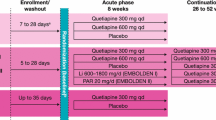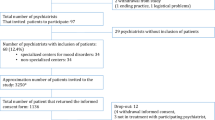Abstract
Objective
The authors sought to compare the outcomes of patients treated by psychiatric residents and attending psychiatrists.
Method
Charts of 121 outpatients meeting criteria for bipolar spectrum disorder were analyzed. Residents treated 41, and attending physicians 80, of 121 patients. Improvement was defined as at least 12 consecutive months of the following: Remission— euthymic mood; Response—much improved mood, not meeting DSM-IV criteria for mild illness; Relapse—remission or response followed by recurrence. The Active Illness group contained patients who did not have 12 months of Remission or Response.
Results
The percentage of improved patients was similar between residents (46.3%; 19/41) and attending physicians (42.5%; 34/80). There was a significant difference in the number of patients in the Remission or Response categories between attending physicians: (26.5%; 21/80) and residents (12.2%; 5/41).
Conclusions
Similar numbers of residents’ and attending physicians’ patients achieved improvement for 12 months, but twice the number of attending physicians’ patients achieved and maintained euthymia.
Similar content being viewed by others
References
American Psychiatric Association: Resident Census: Characteristics and Distribution of Psychiatry Residents in the U.S.A, 2009–2010; Resident Census, 2009–2010; available at www.psych.org
ACGME website; available at http://www.acgme.org/acWebsite/navPages/nav_residents.asp
Tripp AC, Schwartz TL: Psychiatric resident and attending diagnostic and prescribing practices. Acad Psychiatry 2008; 32: 214–217
Castillo EG, Pincus HA, Wieland M, et al: Communication profiles of psychiatric residents and attending physicians in medication-management appointments: a quantitative pilot study. Acad Psychiatry 2012; 36:96–103
Baker FM: Attending psychiatrists’ vs. residents’ knowledge of geriatric depression. Acad Psychiatry 1993; 17:112–113
Davis LE, King MK, Skipper BJ: Education research: assessment of neurology resident clinical competencies in the neurology clinic. Neurology 2009; 72:e1–e3
Sachs GS, Thase ME, Otto MW, et al: Rationale, design, and methods of the systematic treatment enhancement program for bipolar disorder (STEP-BD). Biol Psychiatry 2003; 53:1028–1042
Sachs GS, Nierenberg AA, Calabrese JR, et al: Effectiveness of adjunctive antidepressant treatment for bipolar depression. N Engl J Med 2007; 356:1711–1722
Author information
Authors and Affiliations
Corresponding author
Rights and permissions
About this article
Cite this article
Rapport, D.J., Paul, P., McGrady, A. et al. Comparing Treatment Outcomes of Bipolar Patients Between Psychiatry Residents and Attending Physicians. Acad Psychiatry 37, 329–331 (2013). https://doi.org/10.1176/appi.ap.11120220
Received:
Revised:
Accepted:
Published:
Issue Date:
DOI: https://doi.org/10.1176/appi.ap.11120220




